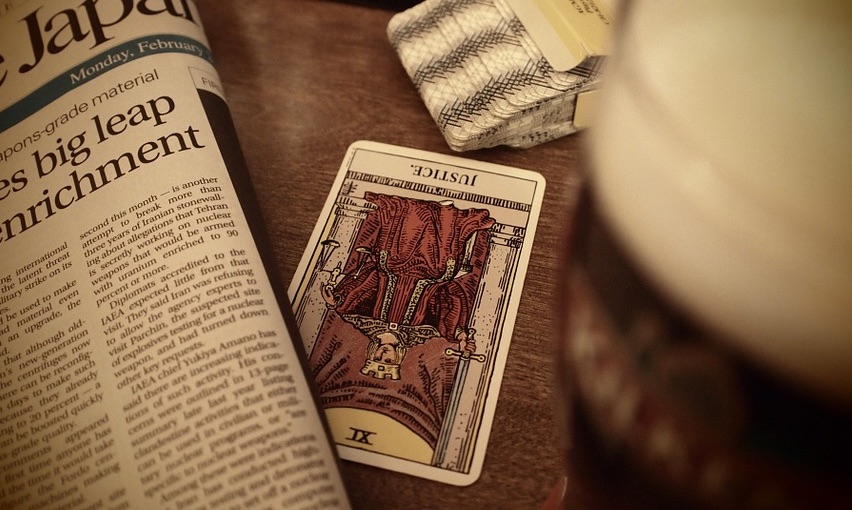The tarot card known as Justice, with its balanced scales and sword, epitomizes the quest for equilibrium and fairness. When this card appears in a reversed position, however, its meaning can shift dramatically. Within a Christian perspective, the Reversed Justice tarot card takes on implications that can be both cautionary and enlightening. Understanding its meanings requires a nuanced exploration of themes such as morality, consequence, and divine justice.
To delve deeper into the Reversed Justice Tarot Card, we must first recognize the fundamental attributes associated with the upright version. Traditionally, the upright Justice card signifies fairness, truth, and the ethical implications of one’s actions. It implies that justice is being served, that wrongdoings are being rectified, and that individuals are held accountable for their decisions. However, when reversed, this card calls into question the very essence of justice itself—revealing a landscape fraught with imbalance and moral ambiguity.
From a Christian standpoint, the reverberations stemming from the Reversed Justice card can be elaborated in several dimensions. Firstly, it invites contemplation on the concept of divine justice. In Christianity, the belief in an all-knowing God who governs the universe with fairness and love is paramount. However, the Reversed Justice suggests a dissonance between divine and human justice. It raises questions such as: Are we being just to ourselves and others? Do we allow prejudice and bias to cloud our judgment? Such introspection aligns with the call for repentance, urging believers to seek forgiveness and reevaluate their moral compass.
Moreover, the Reversed Justice card can symbolize an ongoing conflict between personal desires and divine will. Christians are often faced with choices that pit their immediate desires against spiritual truths. Here, the reversed card acts as a reminder of the necessity of aligning oneself with God’s teachings. It suggests that neglecting ethical principles can result in consequences not only for oneself but for others. Personal transgressions can lead to systemic injustices, amplifying the need for compassion, equity, and righteousness in daily interactions.
In examining the Reversed Justice card through the lens of morality, it becomes evident that it serves as a potent warning against deceit and dishonesty. Much like Ananias and Sapphira from the Book of Acts, who faced dire consequences for their dishonesty, the Reversed Justice card underscores the potential for one’s lack of integrity to become a stumbling block not just personally but for the community. It illustrates the gravity of one’s choices, resonating with the biblical principle that all actions bear weight; a simple deceit can lead to broader ramifications.
The aspect of accountability emerges prominently within the interpretation of the Reversed Justice card. In the Christian faith, believers are urged to consider their actions and their impacts on others. Failure to do so may lead to feelings of guilt or a crisis of conscience. The card warns that one might be evading personal responsibility or, conversely, burdening themselves with guilt over past decisions. Such emotional turmoil calls for self-reflection and contrition, encouraging believers to find solace in God’s grace while committing to a path of righteousness moving forward.
Additionally, the Reversed Justice card often signals disharmony between societal structures and the values espoused by Christianity. It invites serious discourse on the societal injustices that pervade communities, echoing Christ’s message of advocating for the marginalized. This card compels believers to act in accordance with their faith by engaging in social justice efforts, challenging inequalities, and seeking restorative paths. When faced with the implications of reversed justice, Christians are encouraged to champion the cause of the oppressed, embodying the Christian tenet of love and compassion.
Ultimately, interpreting the Reversed Justice tarot card through a Christian perspective unveils a complex tapestry of moral considerations that transcend individual experiences. It embodies a call to righteousness amidst a world often characterized by ambiguity and treachery. Believers are reminded to cultivate discernment, align their actions with divine principles, and earnestly pursue justice, not only in their lives but within the broader community.
As the exploration of the Reversed Justice card unfolds, it becomes clear that it serves as a mirror reflecting both individual and collective moral fiber. Its presence prompts a critical examination of one’s life, actions, and the justice—or lack thereof—that permeates every facet of existence. In this way, the Reversed Justice Tarot card becomes not merely a warning but an opportunity for significant spiritual growth, challenging individuals to rise to the occasion and seek true justice that aligns with God’s divine will.
In summary, the Reversed Justice Tarot card, viewed through the lens of Christian ideology, serves to illuminate the intricacies of moral dilemmas, the importance of accountability, and the urgent need for compassionate advocacy in a broken world. It not only encourages inner reflection but also entreats earnest action toward a more just society, exhorting individuals to uphold the essence of justice as aligned with their faith.







Leave a Comment